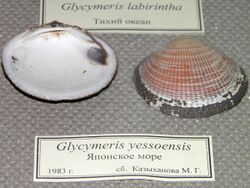Biology:Glycymeris yessoensis
| Glycymeris yessoensis | |
|---|---|

| |
| Interior and exterior of shell | |
| Scientific classification | |
| Domain: | Eukaryota |
| Kingdom: | Animalia |
| Phylum: | Mollusca |
| Class: | Bivalvia |
| Order: | Arcida |
| Family: | Glycymerididae |
| Genus: | Glycymeris |
| Species: | G. yessoensis
|
| Binomial name | |
| Glycymeris yessoensis (Sowerby, 1889)[1]
| |
Glycymeris yessoensis is a species of bivalve mollusc in the family Glycymerididae. It can be found burrowing in soft sediment in shallow water in the Pacific Ocean around the coasts of China and Japan.[1] It is often associated with a polychaete worm with which it forms a commensal relationship.
Taxonomy and evolution
This species was first described by the British malacologist George Brettingham Sowerby III in 1889 (or 1888). It has a long fossil record, having been found in formations in southwestern Sakhalin dating back to the lower middle Miocene, with numerous occurrences in the Neogene and Quaternary periods in northern Japan. In the fossils it is possible to observe changing patterns of drilling predation over the aeons, with the sites of drill holes varying with time, perhaps due to a change in the principle predators, from Glossaulax to Cryptonatica.[2] Almost unispecific beds of fossils of Glycymeris yessoensis are found in the Onma Formation in central Japan.[3]
Distribution and habitat
Glycymeris yessoensis is native to the north central Pacific Ocean where it occurs in the Yellow Sea and the Sea of Japan, its range extending as far north as the Kamchatka Peninsula. It is found burrowing in sand at depths ranging between the intertidal zone and 60 m (200 ft).[4]
Ecology
Glycymeris yessoensis can live for 45 years.[2] It is a filter feeder, drawing water in through one siphon and expelling it through another. It often acts as a commensal host to the boring polychaete worm Polydora glycymerica. This worm burrows into the bivalve's shell creating a U-shaped burrow near the mollusc's siphon, intercepting some of the food particles from the feeding current created by the mollusc.[5]
References
- ↑ 1.0 1.1 Huber, Markus (2018). "Glycymeris yessoensis (G. B. Sowerby III, 1889)". WoRMS. World Register of Marine Species. http://www.marinespecies.org/aphia.php?p=taxdetails&id=504500.
- ↑ 2.0 2.1 Amano, Kazutaka (2006). "Temporal Pattern of Naticid Predation on Glycymeris yessoensis (Sowerby) during the Late Cenozoic in Japan". PALAIOS 21 (4): 369–375. doi:10.2110/palo.2005.P05-37e.
- ↑ Konishi, Kenji (1970). "Fibrous Aragonite in Sealed Pliocene Glycymeris yessoensis: Postmortem: Abstract". AAPG Bulletin 54 (5): 856. doi:10.1306/5D25CAE3-16C1-11D7-8645000102C1865D.
- ↑ Bernard, F.R.; Cai, Ying-Ya; Morton, Brian (1993). A Catalogue of the Living Marine Bivalve Molluscs of China. Hong Kong University Press. p. 29. ISBN 978-962-209-324-9. https://books.google.com/books?id=nSrxAQAAQBAJ&pg=PA29.
- ↑ Radashevsky, Vasily I. (1993). "Revision of the Genus Polydora and Related Genera from the North West Pacific (Polychaeta : Spionidae". Kurenai.
Wikidata ☰ Q13643602 entry
 |

